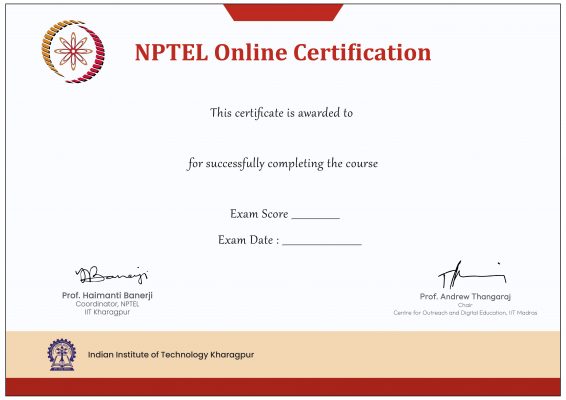Description
The course will start with a brief introduction to robots and robotics. The motivation behind keeping robots in modern industries will be discussed. After providing a brief history of robotics, different components of a robotic system will be identified. The method of determining degrees of freedom of a robotic system will be discussed with some examples. After classifying the robots based on certain criteria, workspace analysis of manipulators will be carried out. Applications of robots in different areas like in manufacturing units, medical science, space, and others, will be discussed. Various methods of robot teaching will be explained with some suitable examples. Economic analysis will be conducted to decide whether we should purchase a robot. Both forward and inverse kinematics problems will be solved with the help of some suitable examples. To ensure smooth variation of joint angles of the robot, trajectory planning schemes will be explained. After carrying out velocity analysis with the help of Jacobian matrix, inverse dynamics problems of robots will be solved using Lagrange-Euler formulation. Control scheme used in robots to realize the joint torques will be discussed. Besides manipulators, analysis will be carried out on wheeled and multi-legged robots. The working principles of various sensors used in robots will be explained in detail. The steps to be followed in robot vision will be discussed with some suitable examples. The principles of motion planning algorithms will be explained in detail. Thus, this course will deal with all the issues related to kinematics, dynamics, control schemes and robot intelligence.
INTENDED AUDIENCE
INDUSTRY SUPPORT
- RDCIS, Ranchi
- CMERI, Durgapur
- Reliance Industries
- C-DAC, Kolkata, and others
ABOUT THE INSTRUCTOR

I received BE (Hons.) and M. Tech. from REC (NIT) Durgapur, India, in 1988 and 1994, respectively. I obtained my Ph.D. from IIT Kanpur, India, in 2000. I received University Gold Medal, A.M. Das Memorial Medal, Institution of Engineers’ (I) Medal, and others. I completed my post-doctoral studies in Japan and then, in Germany under the Alexander von Humboldt Fellowship Programme. I received Shastri Fellowship (Indo-Canadian) in 2019, INSA Teachers’ Award 2020, New Code Of Education 2021 Award, Distinguished Alumnus Award 2021 of NIT Durgapur. I received World’s Top 2% Scientists honor in a survey carried out by Stanford University, USA, in 2020, 2021; Outstanding Researcher 2021 (h-index and award) reported by www.research.com. I am working now as a Professor (HAG scale) of IIT Kharagpur,India. My research areas include robotics, soft computing and manufacturing science. I have published more than 300 papers and book-chapters. I have written the textbooks on “Soft Computing” and “Fundamentals of Robotics”, co-authored another textbook on “Analytical Engineering Mechanics”, edited a book on “Intelligent and Autonomous Systems”, co-authored reference books on “Modeling and Analysis of Six-legged Robots”; “Modeling and Simulations of Robotic Systems Using Soft Computing”; “Modeling and Analysis of Laser Metal Forming Processes by Finite Element and Soft Computing Methods” and “Multibody Dynamic Modeling of Multi-legged Robots”. My textbook on “Soft Computing” had been translated into Chinese language in 2009. I have guided 24 Ph.D.s. I am in editorial board of a few International Journals. I have been elected as FIE, MASME and SMIEEE. I have completed a few sponsored (funded by DST, DAE, MHRD) and consultancy projects. I have filed two patents, and applied for one Copyright.



Reviews
There are no reviews yet.